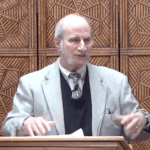By Dr. Joseph Chuman

I am sure that when you read this you will still be cloistered in your home with your emotions governed by the pandemic, which will be with us for a long time, maybe as long as it will take for a vaccine to vanquish it. We are going through an experience unique to American life in the past hundred years. It is an event that will be inscribed in history books as one of the most significant disasters our country has endured.
When we look at the toll in human life and suffering that the plague has engendered, when we countenance the economic devastation and the anxiety and misery it has wrought, there is no escaping that what we are experiencing is assuredly a disaster. It’s a freakish event that nature has foisted upon us and has left us unprepared. We will get through it, but at this moment it is fair to conclude that it will get worse before it gets better.
Laying the groundwork for human flourishing
But it will someday end. I am by temperament not one who believes that every dark cloud has a silver lining. Nor do I believe that we should welcome bad experiences in order to more vividly appreciate the good. Or that there is redemption in the reality that hard challenges are needed to embolden us and endow us with greater fortitude. And I certainly don’t believe that there is some higher purpose standing behind this plague.
It is simply a fact, I believe, that bad things often occur unbidden. But it is up to us to respond as productively and creatively as we can to rebuild our lives and our society, as we always have to help lay the groundwork for human flourishing. While I believe as a humanist that the future is always an open future, and there is no preordained design directing our response to the disaster, I am willing to concede that history does seem often to move in broad dialectical patterns. This is not because there is an invisible hand standing above and directing human affairs, but because times of hardship can inspire human beings to rebuild and find renewal in framing optimistic visions.
After horrors, great strides toward unity
There are historical precedents. World War I, “the war to end all wars,” ushered in the Roaring Twenties, and until the Great Depression, the economy flourished for about a decade. World War II marked the nadir of the career of humankind. With more than 60 million dead, with the evils of Auschwitz and the nuclear destruction of Hiroshima and Nagasaki, the end of the war saw the rebuilding of Europe and a half-century of unity and peace the continent had never experienced. The dark days of the Second World War were followed by decolonization and the independence of the peoples of Africa and Asia from their European masters. The postwar decades also spurred unprecedented flourishing of the American economy and a more extensive middle class than the world had ever seen. The horrors of Nazism gave birth to the Universal Declaration of Human Rights, ushering in an era of enfranchisement of wider and wider circles of people who had been from time immemorial consigned to the margins of society to suffer the degradation of discrimination.
As noted, there can be no guarantees, but I predict that the devastation wrought by the coronavirus pandemic will be met by such a renewal of society and enable us to chart a future in a more progressive direction. It has unmasked realities, economic, social, and intellectual, that will serve as foundations for future organizing and political action.
Next, renewed respect for science and reason
There are many such realities. First, for the past several years we have inhabited a dark ages of unimaginable character. Science, reason, respect for knowledge and expertise, even truth itself, have become optional and discredited, coming from the highest echelons of power and poisoning wide swaths of the American landscape. Frightening and insufferable! I predict that when the plague comes to an end, expertise, science, and reason will be restored to their rightful place as groundwork for the maintenance of society and as attributes of human dignity.
Despite what we have been told about the wonderful state of the American economy, the reality is that with 40 percent of Americans struggling to pay their monthly bills, and that number possessing fewer than $400 in savings, the American economy is an anxiety-inducing house of cards. With society virtually shut down, tens of million are rendered jobless overnight, and without employment, many millions more have been added to the number bereft of health coverage.
Status quo is unsustainable
The collective pain is immeasurable and the realities revealed by the pandemic bring to light with crystal clarity that the status quo is unsustainable. The corporate class and its modern-day robber barons will not save us; they don’t care.
I predict that the extraordinary experience of suffering through this contemporary plague and the hardship it brings will usher forth a renewed political and social movement demanding truth, fairness, and econ-omic justice.
In my address of May 3, I want to talk about these changes that lie ahead, and more. I have entitled my talk “Out of Disaster, Good Things Can Happen.” I hope you can join me then, and may you and your loved ones stay safe and well.
Dr. Joseph Chuman is leader of the Ethical Culture Society of Bergen County.


